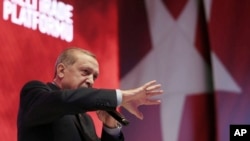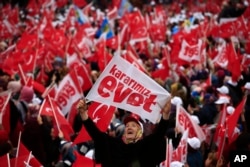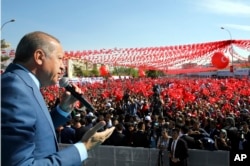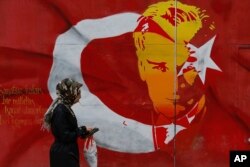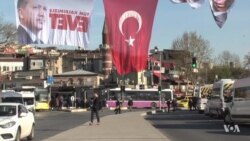Voters in Turkey will consider a constitutional referendum Sunday on whether to transform their government from the current parliamentary system into a powerful executive presidency. The issue has split the nation. Critics accuse President Recep Tayyip Erdogan of trying to create a dictatorship, while his supporters claim the changes will protect the will of the people.
Istanbul, Turkey’s largest city, accounts for about one-fifth of the electorate, and how it votes will likely prove decisive in Sunday's referendum.
Opinion polls indicate the outcome is too close to call. Both sides are feverishly campaigning. "Yes," campaigners argue that extending the president's powers will strengthen democracy by ensuring stability.
In the central Besiktas district of Istanbul, near the Prime Minister’s office in the city, "Yes" and "No" campaigners face off against each other, in a cacophony of competing campaigning songs.
One man shouts, "Against the terrorists, we say 'YES!' Against imperialist powers, we say 'YES!'” Another chimes in, “We vote 'YES,' against the games of the West and against Zionism,“ quickly adding and “against crusaders.”
For the "No" voters the proposed reforms - extending presidential power over the judiciary and allowing rule by decree - open the door to dictatorship.
"People come and ask us why we should say ’no,’" this woman "No" campaigner says, adding, “We try to explain to them. To be honest, we say no to the one-man regime."
For both opponents and supporters, the referendum has come down to one man: incumbent President Recep Tayyip Erdogan.
The "Yes" campaigners believe the proposed reforms are all about enabling the president to continue to carry out his program to develop Turkey. "When Recep Tayyip Erdogan came to power with his AK party, he first fought against gangs and the deep state, took very important steps in the health sector,” declares "Yes" campaigner Hasan Gokalp. “And now, compared to the 2000s, Turkey has a 500 percent increase in progress."
"Yes" campaigners focus on Erdogan’s achievements rather than the merits of the constitutional reforms. For many it appears a winning strategy, because after nearly 20 years in power, Erdogan still remains by far Turkey’s most popular politician.
"I have been voting for Tayyip Erdogan for 17-18 years, and he never failed me," says retiree Ibrahim Yazka explaining why he will vote "Yes." "If he wants, he can just sit in the presidential mansion and sign papers. But this man loves this country so much that he can't stop. He believes he should do more. That's why I believe in him."
But the fairness of the referendum campaign is increasingly in question. In many areas of Istanbul, like the rest of the country, it can be difficult to find "No" flags and posters.
Numerous "No" campaign rallies were banned by state officials. In Istanbul, the city governor rejected repeated requests to allow a large "No" vote rally, citing security concerns. But last weekend allowed major rallies both on Saturday and Sunday for the "Yes" campaign.
According to a recent study, 90 percent of media coverage was devoted to the "Yes" campaign.
The European Union and Council of Europe have voiced concern over the fairness of the campaign, highlighting the fact that it's being carried out under Emergency Rule introduced after July’s failed coup attempt.
“Legitimate dissent and criticism of government policy are vilified and repressed,” warned Council of Europe’s human rights commissioner Nils Muiznieks about the impact of Emergency Rule ahead of the campaign.
The pro-Kurdish HDP, Turkey's second largest opposition party and one of the most ardent opponents of the proposed constitutional reform, has faced the greatest difficulties.
Watch: Turkish Referendum Is Too Close to Call
"We are seeing political pressure," says Ercan Demir a district head of the HDP in Istanbul. "Our co-leaders and 13 members of parliament are in prison, and almost five thousand of our people are facing charges or under arrest. We can't talk about a fair vote and an honest referendum here." He adds, "But hope never goes away, that's what is important. We shouldn't give up hope. As our co-leader Demirtas says: 'Courage is contagious.' "
Despite such obstacles, the referendum is still too close to call, with the latest polls indicating opposite results, but both within the margin of error.
Some observers suggest that could be due, in part, to a perception that the difficulties facing the "No" campaigners only strengthen their argument that Turkish democracy is at stake on Sunday.




